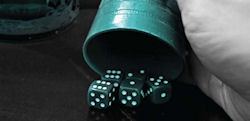This article first appeared in the Sep/Oct 2010 issue of World Gaming magazine.
In nearly every bar or nightclub in Macau you will see guys and girls shaking cups of dice and slamming them down on the table. You will then see frantic hand signals indicating numbers or people calling out numbers if the music isn’t too loud. Chinese people love gambling and they love dice and there are many different games out there that combine the two. The game we are looking at in this issue is called ‘Liar’ and it’s one of the most popular gambling and drinking games ever invented.

The great thing about ‘Liar’ is that any number of people can play it, though it can be a little confusing if the number of players swell to more than seven or eight. Anywhere between two and six players is ideal and it is a great game heads up.
The players each have a cup with five dice in it. Every player shakes up their dice cup and dramatically slams it on the table. You then look at your dice being careful that no one else is taking a peek.
This is a game of bidding. The first thing you do is add up the number of dice that are in play. Let’s assume that there are four players. Each player has five dice which makes a total of 20 dice in play.
The next most important thing to consider is that dice showing the number one are wild. This means that they can be used as any number. For example let’s say you roll and your five dice read 1, 1, 3, 3, 4. This means that you have two 2s (the two 1s are wild and therefore count as 2s), four 3s (the two ‘real’ threes plus the two wild dice), three fours, two fives or two sixes. You also have two 1s but that is a special case that we will cover later.
Because there are four players in the game, the person who starts the bidding must begin by bidding at least four of something. If there were three players then the minimum bid would be three of something. With four players the minimum bid is four 2s, as 2s are the lowest number. The next lowest bid would be four 3s and so on to four 6s. Five 2s is a higher bid than four 6s. The game continues around the table and players have two options. They can either increase the bid or they can call the last bid and see if the last bidder’s total is correct. Eventually someone gets called and then the fun begins. All players reveal their dice, and if the bidder’s bid of the total number of that particular number wasn’t correct, he loses. If it was, the caller loses.
For example, lets say the bid gets to nine 5s. The next player calls, everyone shows their dice. If there are nine or more 5s (remember all 1s are wild and count as 5s), the caller loses. If there are eight or less 5s, the person who bid nine 5s loses. Of course, the loser must drink to satisfy the honour of the rest of the players!
The most important thing to remember with ‘Liar’ is that you are calling the total amount of the number that all the players have in the game. With all the dice showing one being wild it is surprising how high the figure can reach. On the other hand if you have an absence of wild dice then the figure can be quite low.

The only twist on the game is that people can bid a total of wild dice. For example they might bid six 1s. Six 1s is a higher bid than 6 sixes (just like the ace in playing cards, the 1 is considered the highest number). If any player bids a total using the ones then the ones cease being wild and simply become the highest standard number for the rest of that game (even if the final called bid is not a bid of 1s). This is a more advanced, and therefore less common technique to the game. When you first start playing ‘Liar’ with your friends you are best to ignore any strategy involving bidding 1s until you gain a better understanding of how the game works.
Strategies for ‘Liar’
- Don’t always increase your bid by one. When the bids start to get high you don’t want the bidding to get back to you for another turn so put the pressure on early and don’t be afraid to increase the bid by big jumps. For example after a bid of six 3s go to something like nine 3s or eight 4s. This really puts the pressure on opponents that are due to bid immediately after you.
- Remember this is a game of partial information. You know your dice, you know the other players’ prior bids, and if you are very observant, you know the other players’ tendencies. Use that information.
- Bluff. You must bluff in this game especially when you are playing heads up or against a small number of players. Bluffing early can create confusion in the minds of your opponents when the bidding gets serious. This is great practise if you happen to be a poker player!
- Be creative and mix things up. Don’t be predictable. Bid with the goods and then mix it up with a bluff. Start with a small bid but then next time launch with a big bid.
- Remember that your opponents aren’t always telling the truth. If you smell a rat, trust your instincts and call them down.
- Treat ‘Liar’ as the fun game that it is and remember winning is a great way to impress the girls while drinking!







